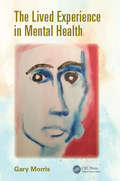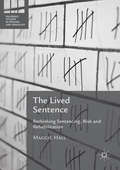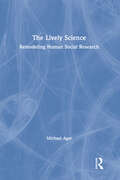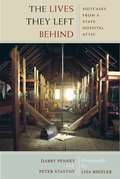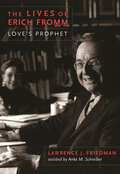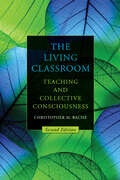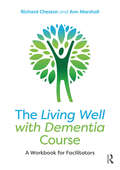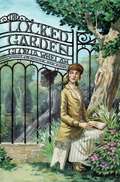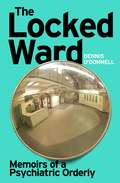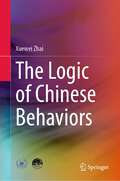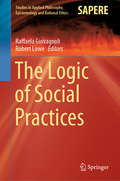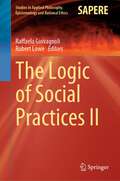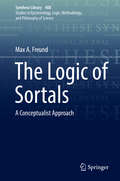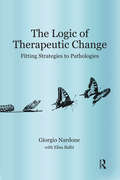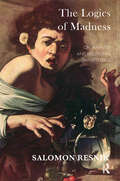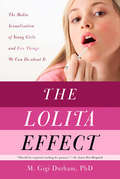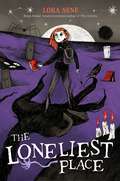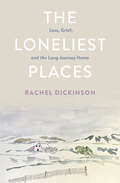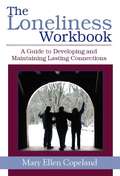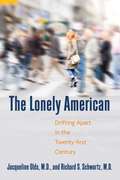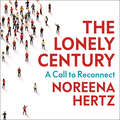- Table View
- List View
The Lived Experience in Mental Health
by Gary MorrisThe importance of recognising the knowledge and the needs of service users and engaging them more proactively within the care process is now widely acknowledged, but it is not always clear how this can come about. The Lived Experience of Mental Health highlights individuals’ own lived and felt mental health experience in order to share their expertise about mental health problems and the care offered. This text begins by exploring the importance of engaging with the internal world of those living with various mental health problems and reflecting upon personal narratives as means of expressing and sharing experience, as well as the status of these narratives as 'evidence'. The central section of the book looks at five commonly experienced mental health states: anxiety problems, depression, mood extremes, states of altered reality (linked, for example, with psychosis and schizophrenia) and impaired cognition (linked, for example, with dementia). The chapters look at how the mental state in question is experienced, including the experience of it in the context of the wider world, where health and social care services and the responses of other people play a part. Drawing on personal narratives from a wide range of sources, this text foregrounds the voices of experts by experience and relates them to the academic literature. The narratives collectively convey a breadth of experience including both concepts of struggling and living well with mental health issues. The book ends by outlining resources where a range of first-person narratives can be accessed, from online forums to films, and providing a strategy for teaching and learning associated with the exploration of lived experience narratives. Designed for health professionals working with people experiencing mental health problems, this illuminating text uses personal narratives to emphasise the importance of person-centred care and participation by services users in their own care. It will also be an interesting read for experts by experiences themselves as well as their families and friends.
The Lived Sentence
by Maggie HallThis book examines the lives of the sentenced to argue that 'sentencing' should be re-conceived to consider the human perspective. It combines a range of modern criminological and legal theories together with interviews with prisoners in New South Wales, to examine their lives during and beyond completing the terms of imprisonment, for a more continuous and coherent perspective on the process of 'sentencing'. This book makes a strong argument for the practical advantages of listening to the voices of the sentenced and it is therefore a useful tool for the correctional community engaged in providing services and programmes to reduce recidivism. A methodological and well-researched text, this book will be of particular interest to scholars of criminal justice and the penal system, as well as policy makers and practitioners.
The Lively Science: Remodeling Human Social Research
by Michael AgarThe Lively Science is Michael Agar's accessible, idiosyncratic, often humorous, and sometimes controversial explication of his own polestar truth: "Research on humans in their social world by other humans is not a traditional science like the one created by Galileo and Newton." However, if the social world is not a lab, neither is it a collection of random events. The book lays out a clear, straightforward path to carrying out the basic scientific tasks of forming questions and answering them to explore and account for that non-randomness. The author deploys myriad engaging examples drawn from a lifetime of applied and basic research to demonstrate how human science researchers can produce discoveries that are scientifically defensible and useful in the real world. Agar grounds his how-to guide in an approachable discussion of epistemology and draws on thinkers whose writings may be unfamiliar to many social scientists. He blends that work with new intellectual tools, such as complexity theory, disasters research, and conversational analysis. The result is an innovative and practical methodology that is true to the realities and surprises of research by and about humans, yet preserves scientific standards of falsifiability, empiricism, logic, and systematic presentation of results. This book represents the best of Michael Agar's visionary work. With a new foreword by Michael Brown celebrating Agar's enormous contribution to social science methodology, The Lively Science is for all researchers who seek to explore the full potential of a human social science.
The Lives They Left Behind
by Robert Whitaker Darby Penney Peter Stastny Lisa Rinzler"The Lives They Left Behind is a deeply moving testament to the human side of mental illness, and of the narrow margin which so often separates the sane from the mad. It is a remarkable portrait, too, of the life of a psychiatric asylum--the sort of community in which, for better and for worse, hundreds of thousands of people lived out their lives. Darby Penney and Peter Stastny's careful historical (almost archaeological) and biographical reconstructions give us unique insight into these lives which would otherwise be lost and, indeed, unimaginable to the rest of us."--Oliver Sacks, M.D., Professor of Neurology and Psychiatry, Columbia University Medical Center, Columbia University Artist, and author of Musicophilia "The haunting thing about the suitcase owners is that it's so easy to identify with them."--Newsweek "In their poignant detail the items helped rescue these individuals from the dark sprawl of anonymity."--The New York Times "[The authors] spent 10 years piecing together . . . the lives these patients lived before they were nightmarishly stripped of their identities."--Newsday More than four hundred abandoned suitcases filled with patients' belongings were found when Willard Psychiatric Center closed in 1995 after 125 years of operation. They are skillfully examined here and compared to the written record to create a moving--and devastating--group portrait of twentieth-century American psychiatric care.
The Lives They Left Behind: Suitcases from a State Hospital Attic
by Darby Penney Peter StastnyThis book grew out of ten years of research conducted by two journalists who discovered a trove of abandoned trunks and suitcases in an attic at Willard State Hospital in New York. Through extensive research they were able to reconstruct the histories of ten patients who were hospitalized at Willard during the years before deinstitutionalization. Through the microcosm of individual lives the authors humanize the tragedy of our treatment of people deemed to be mentally ill.
The Lives of Erich Fromm: Love's Prophet
by Lawrence J. Friedman Anke M. SchreiberThis &“brilliantly comprehensive study&” explores the influential thinker&’s contributions to psychology, philosophy and more—&“academic biography at its best&” (Kirkus, starred review). Erich Fromm was a political activist, psychologist, psychoanalyst, philosopher, and one of the most important intellectuals of the twentieth century. Known for his theories of personality and political insight, Fromm dissected the sadomasochistic appeal of populist dictators. He eloquently championing the virtues of love rooted in joyful contact with others and humanity at large. Admired all over the world, Fromm continues to inspire with his message of universal brotherhood. In the first systematic study of Fromm's influences and achievements, Lawrence J. Friedman revisits the thinker's most important works, including Escape from Freedom and The Art of Loving. He also recounts Fromm's political activism as a founder of Amnesty International, the National Committee for a Sane Nuclear Policy, and other peace groups. Friedman also reveals Fromm's support for anti-Stalinist democratic movements in Central and Eastern Europe and his efforts to revitalize American democracy. Friedman elucidates Fromm's key intellectual contributions, especially his innovative concept of "social character," in which social institutions and practices shape the inner psyche, and he clarifies Fromm's conception of love as an acquired skill. Taking full stock of the thinker's historical and global accomplishments, Friedman portrays a man of immense authenticity and spirituality who made life in the twentieth century more humane than it might have been.
The Lives of Erich Fromm: Love's Prophet
by Lawrence FriedmanErich Fromm was a political activist, psychologist, psychoanalyst, philosopher, and one of the most important intellectuals of the twentieth century. Known for his theories of personality and political insight, Fromm dissected the sadomasochistic appeal of brutal dictators while also eloquently championing love—which, he insisted, was nothing if it did not involve joyful contact with others and humanity at large. Admired all over the world, Fromm continues to inspire with his message of universal brotherhood and quest for lasting peace.The first systematic study of Fromm's influences and achievements, this biography revisits the thinker's most important works, especially Escape from Freedom and The Art of Loving, which conveyed important and complex ideas to millions of readers. The volume recounts Fromm's political activism as a founder and major funder of Amnesty International, the National Committee for a Sane Nuclear Policy, and other peace groups. Consulting rare archival materials across the globe, Lawrence J. Friedman reveals Fromm's support for anti-Stalinist democratic movements in Central and Eastern Europe and his efforts to revitalize American democracy. For the first time, readers learn about Fromm's direct contact with high officials in the American government on matters of war and peace while accessing a deeper understanding of his conceptual differences with Freud, his rapport with Neo-Freudians like Karen Horney and Harry Stack Sullivan, and his association with innovative artists, public intellectuals, and world leaders. Friedman elucidates Fromm's key intellectual contributions, especially his innovative concept of "social character," in which social institutions and practices shape the inner psyche, and he clarifies Fromm's conception of love as an acquired skill. Taking full stock of the thinker's historical and global accomplishments, Friedman portrays a man of immense authenticity and spirituality who made life in the twentieth century more humane than it might have been.
The Living Classroom, Second Edition: Teaching and Collective Consciousness
by Christopher M. BacheA pioneering work in teaching and transpersonal psychology, The Living Classroom explores the dynamics of collective consciousness in the classroom. In this second edition, Bache has, in his own words, "come out of the psychedelic closet," speaking candidly about the role that psychedelics played in the development of his integral, holistic pedagogy. Combining scientific research with personal accounts collected over thirty years, Bache examines the subtle influences that radiate invisibly around teachers as they work—unintended, cognitive resonances that spring up between teachers and students in the classroom. While these kinds of synchronistic connections are often overlooked by traditional academics, Bache demonstrates that they occur too frequently and are too pointed to be dismissed as mere coincidence. Drawing upon Rupert Sheldrake's theory of morphic fields, Bache proposes that well-taught courses generate "learning fields" around them, forms of collective consciousness that can trigger new insights and startling personal transformations. Moving beyond theory, this book is rich with student stories and offers practical, hands-on strategies for teachers who want to begin working with these learning fields to take their teaching to a more conscious level.
The Living Well with Dementia Course: A Workbook for Facilitators
by Richard Cheston Ann MarshallThe Living Well with Dementia Course: A Workbook for Facilitators will be an indispensable guide to providing support to people after they have received a dementia diagnosis. The workbook provides facilitators with a realistic but positive approach to helping people with dementia understand and adjust to their condition, helping them to live as well as possible. This workbook outlines the Living Well with Dementia course, a post-diagnostic course for people who have recently received a diagnosis of dementia. Its session-by-session structure, along with e-resources including handouts for course participants, will help facilitators provide a realistic but positive approach to support after a diagnosis. Aimed at facilitators, and drawing on the authors’ many years of clinical and research experience, The Living Well with Dementia Course workbook will be of great assistance to healthcare professionals and support workers in many different settings, including specialist NHS dementia services, primary care services and the voluntary and community sector.
The Locked Garden
by Gloria WhelanIt's the year 1900, the dawn of a new century and a chance for a new beginning for Verna and Carlie, whose mother died two years ago. They are headed to their new home-the grounds of an asylum for the mentally ill. Their father, a doctor, has been hired to treat its patients while the girls are under the strict and watchful eye of their aunt Maude. The towering asylum, the murmuring patients with their tormented pasts, the exquisite locked garden at the center of the grounds-Verna perceives forbidden mystery and enchantment everywhere. Even Aunt Maude's temper will not keep her from striking out on her own exciting adventures. But is Verna ready to confront all the secrets and emotions that have been locked within-even those of her own heart?
The Locked Ward: A humane and revealing account of life on the frontlines of mental health care.
by Dennis O'DonnellAn extraordinary account of life behind the locked doors of a secure psychiatric ward from a nurse who worked there for seven years. Dennis O'Donnell started work as an orderly in the Intensive Psychiatric Care Unit of a large hospital in Scotland in 2000. In his daily life he encountered fear, violence and despair but also a considerable amount of care and compassion. Recounting the stories of the patients he worked with, and those of his colleagues on the ward, here he examines major mental health conditions, methods of treatment - medication, how religion, sex, wealth, health and drugs can bear influence on mental health, the prevailing attitudes to psychiatric illness, the authorities, the professionals & society. What emerges is a document of humanity and humour, a remarkable memoir that sheds light on a world that still remains largely unknown. 'This is a superb study of people whose minds have gone wrong, and the art of caring for them' Evening Standard
The Logic of Chinese Behaviors
by Xuewei ZhaiThis book presents a discussion on Chinese people’s internal and external psychologies and logics, as well as the respective stage of social development and cultural context they were raised in, and from sociological, social psychological, and cultural anthropological perspectives. In particular, the book explores the relationship between Chinese people’s behaviors and China’s social and cultural structure. It puts forward a theoretical framework for the analysis of Chinese social behaviors, which is based on the realistic aspects of Chinese people’s day-to-day-lives. The book also concludes that any attempt to study Chinese psychologies and behaviors should “seek the constant among the changes, or at least those aspects that are hardest to change” and investigate the context and background, which can provide a point of departure for current and future research.
The Logic of Social Practices (Studies in Applied Philosophy, Epistemology and Rational Ethics #52)
by Raffaela Giovagnoli Robert LoweThis book reports on cutting-edge research concerning social practices. Merging perspectives from various disciplines, including philosophy, biology, and cognitive science, it discusses theoretical aspects of social behavior along with models to investigate them, and also presents key case studies. Further, It describes concepts related to habits, routines, and rituals and examines important features of human action, such as intentionality and choice, exploring the influence of specific social practices in different situations. Based on a workshop held in June 2018 at the 6th World Congress of Universal Logic, UNILOG2018, in Vichy, and including additional invited chapters, the book offers fresh insights into the fields of social practice and the cognitive, computational, and philosophical tools to understand them.
The Logic of Social Practices II (Studies in Applied Philosophy, Epistemology and Rational Ethics #68)
by Raffaela Giovagnoli Robert LoweThis book reports on cutting-edge research concerning social practices. Merging perspectives from various disciplines, including philosophy, biology, psychology and cognitive science, and economy, it discusses theoretical aspects of social behavior along with models to investigate them, and presenting key case studies as well. Further, it describes concepts related to habits, routines, and rituals and examines important features of human action, such as intentionality and choice, exploring the influence of specific social practices in different situations. Based on a workshop held on April 2022 at the World Congress on Universal Logic (UNILOG 22), in Crete, and including additional invited chapters, the book offers fresh insights into the fields of social practice and the cognitive, computational, and philosophical tools to understand them.
The Logic of Sortals: A Conceptualist Approach (Synthese Library #408)
by Max A. FreundSortal concepts are at the center of certain logical discussions and have played a significant role in solutions to particular problems in philosophy. Apart from logic and philosophy, the study of sortal concepts has found its place in specific fields of psychology, such as the theory of infant cognitive development and the theory of human perception. In this monograph, different formal logics for sortal concepts and sortal-related logical notions (such as sortal identity and first-order sortal quantification) are characterized. Most of these logics are intensional in nature and possess, in addition, a bidimensional character. That is, they simultaneously represent two different logical dimensions. In most cases, the dimensions are those of time and natural necessity, and, in other cases, those of time and epistemic necessity. Another feature of the logics in question concerns second-order quantification over sortal concepts, a logical notion that is also represented in the logics. Some of the logics adopt a constant domain interpretation, others a varying domain interpretation of such quantification. Two of the above bidimensional logics are philosophically grounded on predication sortalism, that is, on the philosophical view that predication necessarily requires sortal concepts. Another bidimensional logic constitutes a logic for complex sortal predicates. These three sorts of logics are among the important novelties of this work since logics with similar features have not been developed up to now, and they might be instrumental for the solution of philosophically significant problems regarding sortal predicates. The book assumes a modern variant of conceptualism as a philosophical background. For this reason, the approach to sortal predicates is in terms of sortal concepts. Concepts, in general, are here understood as intersubjective realizable cognitive capacities. The proper features of sortal concepts are determined by an analysis of the main features of sortal predicates. Posterior to this analysis, the sortal-related logical notions represented in the above logics are discussed. There is also a discussion on the extent to which the set-theoretic formal semantic systems of the book capture different aspects of the conceptualist approach to sortals. These different semantic frameworks are also related to realist and nominalist approaches to sortal predicates, and possible modifications to them are considered that might represent those alternative approaches.
The Logic of Therapeutic Change: Fitting Strategies to Pathologies
by Elisa BalbiIn 1993 the authors published The Art of Change: Strategic Therapy and Hypnotherapy Without Trance, a revolutionary work that introduced a series of effective clinical strategies to create therapeutic change, even in seemingly impossible cases. In his new book, the author performs another quantum leap, leading his readers to a more operative knowledge of the precise logic of therapeutic change. Most intimidating mental disorders are based on perceptions of reality that when using an ordinary 'common-sense' logic as our reading lens, look as if they are irrational, bizarre, illogical and therefore hard to understand and manage.
The Logics of Madness: On Infantile and Delusional Transference
by Salomon ResnikIn this book, the author describes his psychoanalytic work with psychotic patients and the logic that underlies their often-delusional constructions. He explores how the concept of psychosis has evolved over time and shows how the delusional world, with its proto-symbolic equations, may amount to a philosophy of life. Clinical examples taken from his own clinical work, both in individual psychoanalysis and in group therapy with schizophrenic patients, illustrate his theses. In his exploration of the psychotic ego and multi-dimensionality, he shows how his work is a continuation of the ideas initially put forward by psychoanalysts such as D. W. Winnicott, Melanie Klein and Hanna Segal, as well as how much it owes to his own analysis with Herbert Rosenfeld and supervision with Wilfred Bion. For Resnik, working with psychotic patients amounts to an "archaeology of the present". He discusses in detail such concepts as narcissistic depression, the atmosphere of the psychoanalytic encounter, the role and impact of dreams in psychosis, and the dimensionality of the psychotic universe.
The Lolita Effect
by Gigi DurhamWe are constantly bombarded with alarming media images: brand-name thong underwear for ten-year-olds with the slogans 'Wink Wink' and 'Eye Candy' printed on them; oversexed and underdressed celebrities gone wild; Bratz dolls and their 'sexy' clothing line for preteens. How do we raise sexually healthy young women in this kind of environment? In The Lolita Effect, university professor and journalist M Gigi Durham offers new insight into media myths and spectacles of sexuality. Using examples from popular TV shows, fashion and beauty magazines, movies and websites, Durham shows for the first time all the ways in which sexuality is rigidly and restrictively defied in media - often in ways detrimental to girls' healthy development. The Lolita Effect offers parents, teachers, counsellors, and other concerned adults effective and progressive strategies for resisting the violations and repressions that render girls sexually subordinate. Durham provides us with the tools to navigate this media world effectively without censorship or moralising, and then to help our girls to do so in strong and empowering ways.
The Lolita Effect: The Media Sexualization of Young Girls and What We Can Do About It
by M. Gigi DurhamIn The Lolita Effect, Dr. M. Gigi Durham offers breakthrough strategies for empowering girls to make healthy decisions about their own sexuality. Pop culture—and the advertising that surrounds it—teaches young girls and boys five myths about sex and sexuality: Girls don't choose boys, boys choose girls—but only sexy girls; there's only one kind of sexy—slender, curvy, white beauty; girls should work to be that type of sexy; the younger a girl is, the sexier she is; and sexual violence can be hot. Together, these five myths make up the Lolita Effect, the mass media trends that work to undermine girls’ self-confidence, that condone female objectification, and that tacitly foster sex crimes. But identifying these myths and breaking them down can help girls learn to recognize progressive and healthy sexuality and protect themselves from degrading media ideas and sexual vulnerability.
The Lolita Effect: The Media Sexualization of Young Girls and What We Can Do About It
by M. Gigi DurhamIn The Lolita Effect, Dr. M. Gigi Durham offers breakthrough strategies for empowering girls to make healthy decisions about their own sexuality. Pop culture--and the advertising that surrounds it--teaches young girls and boys five myths about sex and sexuality: Girls don't choose boys, boys choose girls--but only sexy girls; there's only one kind of sexy--slender, curvy, white beauty; girls should work to be that type of sexy; the younger a girl is, the sexier she is; and sexual violence can be hot. Together, these five myths make up the Lolita Effect, the mass media trends that work to undermine girls' self-confidence, that condone female objectification, and that tacitly foster sex crimes. But identifying these myths and breaking them down can help girls learn to recognize progressive and healthy sexuality and protect themselves from degrading media ideas and sexual vulnerability.
The Loneliest Place (Blight Harbor)
by Lora SenfEvie ventures into the Dark Sun Side to rescue her loved ones, only to discover truths darker than she could have ever imagined in this &“riveting and wildly imaginative&” (Kirkus Reviews) finale to the Blight Harbor series that&’s perfect for fans of Doll Bones and Small Spaces.As summer comes to an end, Evie Von Rathe is determined to begin the search for her parents in earnest. Armed with her knowledge of the otherworldly, her mom&’s violet glasses, and a pendant full of doors, Evie begins to piece together clues. When she realizes her mother&’s bedtime story might be a roadmap to finding them, Evie follows it back to the Dark Sun Side. But stories are funny things, and they change from one teller to the next. The black nothing of the Radix is waiting, and it knows more than it&’s ever let on. Evie will need every bit of courage she has for what&’s coming. With Bird at her side, and maybe even a reluctant Lark as well, Evie has what she hopes is her last adventure under a purple sky.
The Loneliest Places: Loss, Grief, and the Long Journey Home
by Rachel Dickinson"A child's suicide pitches you into a hellish place of fragmentary images, the deepest depression imaginable, efforts to destroy yourself, and an almost complete break with what's happening in the world around you. That was my experience. I wish it upon no one." The essays of The Loneliest Places began as a chronicle of Rachel Dickinson's life after her son's suicide. The pieces became much more. Dickinson writes the unimaginable and terrifying facts of heartbreaking loss. In The Loneliest Places she tells stories from her months on the run, fleeing her grief and herself, as she escapes to Iceland and the Falkland Islands—as far as possible from the memories of her dead son, Jack. She frankly relates the paralyzing emotion that sometimes left her trapped in her home, confined to a single chair, helplessly isolated. The tales from these years are bleak and Dickinson's journey home, back to her changed self and fractured family, is lonely. Conjuring Emily Dickinson, however, she describes how hope was sighted, allowed to perch, and then, remarkably, made actual.
The Loneliness Workbook:A Guide to Developing and Maintaining Lasting Connections
by Mary Ellen CopelandThis workbook is a practical, step-by-step guide for addressing, dealing with, and relieving the loneliness in your life.
The Lonely American: Drifting Apart in the Twenty-first Century
by Jacqueline Olds Richard S. SchwartzThe personal and societal effects of the unheralded epidemic of social isolation in America In today's world, it is more acceptable to be depressed than to be lonely--yet loneliness appears to be the inevitable byproduct of our frenetic contemporary lifestyle. According to the 2004 General Social Survey, one out of four Americans talked to no one about something of importance to them during the last six months. Another remarkable fact emerged from the 2000 U.S. Census: more people are living alone today than at any point in the country's history--fully 25 percent of households consist of one person only. In this crucial look at one of America's few remaining taboo subjects--loneliness--Drs. Jacqueline Olds and Richard S. Schwartz set out to understand the cultural imperatives, psychological dynamics, and physical mechanisms underlying social isolation In The Lonely American, cutting-edge research on the physiological and cognitive effects of social exclusion and emerging work in the neurobiology of attachment uncover startling, sobering ripple effects of loneliness in areas as varied as physical health, children's emotional problems, substance abuse, and even global warming. Surprising new studies tell a grim truth about social isolation: being disconnected diminishes happiness, health, and longevity; increases aggression; and correlates with increasing rates of violent crime. Loneliness doesn't apply simply to single people, either-today's busy parents "cocoon" themselves by devoting most of their non-work hours to children, leaving little time for friends, and other forms of social contact, and unhealthily relying on the marriage to fulfill all social needs As a core population of socially isolated individuals and families continues to balloon in size, it is more important than ever to understand the effects of a culture that idealizes busyness and self-reliance. It's time to bring loneliness--a very real and little-discussed social epidemic with frightening consequences--out into the open, and find a way to navigate the tension between freedom and connection in our lives.
The Lonely Century: A Call to Reconnect
by Noreena Hertz'Indispensable, engaging and brilliant book about the pervasiveness of loneliness in the twenty-first century and its far-reaching impact...a hopeful book that couldn't be more important or timely.' Philippa Perry, author of The Book You Wish Your Parents Had ReadEven before a global pandemic introduced us to terms like social distancing, loneliness was already becoming the defining condition of the twenty-first century.'Fascinating, timely and important...Read it, then pass it on to a friend. If you can find one.' Charlie BrookerCarl, the Los Angeles media executive so lonely he pays to be cuddled. Eric, the Parisian baker finding community in the political far right. Peter, the London schoolboy distraught because no one 'likes' his Instagram posts.All around us, the fabric of community is unravelling and our personal relationships are under threat. And technology isn't the sole culprit; equally to blame are the dismantling of civic institutions, the radical reorganisation of the workplace, mass migration to cities, and decades of neoliberal policies that placed self-interest above the collective good.'Passionately argued and deeply researched, this book is for everyone who wants to build a healthier and more connected world.' Arianna HuffingtonThis is not merely a mental health crisis. Loneliness increases our risk of heart disease, cancer and dementia. Statistically, it's as bad for our health as smoking fifteen cigarettes a day. It's also an economic crisis, costing us billions annually, and a political crisis, with feelings of marginalisation fuelling divisiveness and extremism around the world.But it's also one we have the power to reverse. Combining a decade of research with first-hand reporting, Noreena Hertz takes us from a 'how to communicate in real life' class at an Ivy League university to encounters in German beer gardens between people with radically different political views, from 'renting a friend' in Manhattan to nursing home residents knitting bonnets for their robot caregivers in Japan.Offering bold solutions ranging from compassionate AI to innovative models for urban living to new ways of reinvigorating our neighbourhoods and reconciling our differences, The Lonely Century offers a hopeful and empowering vision for how to heal our fractured communities and restore connection in our lives.(P) 2020 Hodder & Stoughton Ltd
